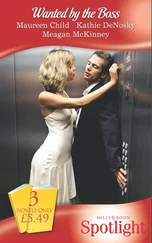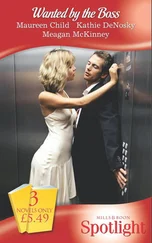Lee Child - A Wanted Man
Здесь есть возможность читать онлайн «Lee Child - A Wanted Man» весь текст электронной книги совершенно бесплатно (целиком полную версию без сокращений). В некоторых случаях можно слушать аудио, скачать через торрент в формате fb2 и присутствует краткое содержание. Жанр: Детектив, на английском языке. Описание произведения, (предисловие) а так же отзывы посетителей доступны на портале библиотеки ЛибКат.
- Название:A Wanted Man
- Автор:
- Жанр:
- Год:неизвестен
- ISBN:нет данных
- Рейтинг книги:4 / 5. Голосов: 1
-
Избранное:Добавить в избранное
- Отзывы:
-
Ваша оценка:
- 80
- 1
- 2
- 3
- 4
- 5
A Wanted Man: краткое содержание, описание и аннотация
Предлагаем к чтению аннотацию, описание, краткое содержание или предисловие (зависит от того, что написал сам автор книги «A Wanted Man»). Если вы не нашли необходимую информацию о книге — напишите в комментариях, мы постараемся отыскать её.
Immediately he knows they're all lying about something – and then they run into a police roadblock on the highway. But they get through. Because the three are innocent? Or because the three are now four?
Is Reacher a decoy?
A Wanted Man — читать онлайн бесплатно полную книгу (весь текст) целиком
Ниже представлен текст книги, разбитый по страницам. Система сохранения места последней прочитанной страницы, позволяет с удобством читать онлайн бесплатно книгу «A Wanted Man», без необходимости каждый раз заново искать на чём Вы остановились. Поставьте закладку, и сможете в любой момент перейти на страницу, на которой закончили чтение.
Интервал:
Закладка:
Sorenson didn’t answer that. She had taken a small sideways step, leftward from the red Mazda’s driver’s-side flank, and she was looking at an angle through the gap between the cocktail lounge and the cinder block bar. She said, ‘I can see the gas station from here. Across the street.’
Goodman said, ‘So?’
‘Anyone over there could see me.’
‘You thinking about witnesses? We’d be pretty lucky if some long haul trucker was pumping his gas at the exact minute our guys arrived here and took off again. And was gazing in the right direction, and was paying close attention instead of scratching his butt. And anyway, how would we find him?’
‘No, I’m thinking the gas station might have cameras. Maybe wide-angle. Like fisheyes. They might see over here.’
Goodman said nothing.
‘Does the gas station have cameras?’
‘I don’t know,’ Goodman said.
‘It might,’ Sorenson said. ‘Some of those big trucks take a hundred gallons. And times are hard right now. Drivers might be tempted to take off before paying. Oil companies wouldn’t like that. They might take defensive measures.’
‘We should go find out.’
‘We will,’ Sorenson said. ‘And then we’ll go bang on Missy Smith’s door. Don’t think we won’t. The old gal can sleep a little more, but not for ever.’
Reacher was an adequate driver, but nothing more than that. Physically his body worked only two ways: either extremely slow or extremely fast. Most of the time he rumbled along with typical big-man languor, often appearing quiet and lazy, sometimes appearing positively comatose. Then if necessary he could explode into furious action, for as long as it took, a blur of hands and feet, and then he would lapse back into torpor. He had no middle setting, and a middle setting was what good driving needed. Action and reaction had to be prompt but controlled, alert but measured, rapid but considered, and it was hard for Reacher to identify that kind of middle ground. Typically he found himself either twitching at a danger two hundred yards ahead, or ignoring it completely, on the grounds that it might go away by itself. He had never killed or injured anyone with a car, except deliberately, but he was a realistic man and didn’t kid himself: his driving was much worse than average.
But as promised the Interstate was straight and wide, back up to three lanes again by that point, and the big soft Chevrolet held its line very well. Night-time traffic was very light and neither action nor reaction was much called for. In fact the biggest challenge was to stay awake, but Reacher was good at that. He could grind along at some basic level of consciousness more or less for ever. He kept both hands on the wheel, ten and two, and he checked his mirrors regularly every twenty or so seconds, first the passenger door, then the windshield mirror, then the driver’s door, then the windshield again. Behind his right shoulder Karen Delfuenso sat awake but silent, tense and anxious, and next to her Reacher could hear Don McQueen breathing slow, not quite asleep but not quite awake either. Alan King was awake in the passenger seat, looking mute and morose and a little preoccupied. His head was half turned, so he could see the road ahead and Reacher together, and the speedometer too, Reacher thought.
So Reacher drove on, at an approximately legal speed, with the crystal pendant on the key tapping him on the knee from time to time, as the car rocked and swayed.
It turned out that the gas station had four cameras, all of them monochrome, none of them colour. They fed a hard disk recorder located on a shelf in the booth behind the register, right next to the cigarettes. The four separate feeds were displayed in real time on a quad-split LCD screen to the left of the cash drawer.
Three of the cameras were of no interest to Sorenson. The first and the second were mounted low down at the vehicle entrance and exit, to capture plate numbers. They were zoomed in too tight to show any background. The third camera was mounted in the ceiling of the cashier’s booth itself, high up behind the guy’s right shoulder, to make sure he wasn’t ripping the place off. Standard practice, in a cash business. Trust but verify.
But the fourth camera was better. Marginally. It was a black glass hemisphere mounted high on a bracket halfway up the sign pole. It was dialled back to a wide-angle view of the whole property. For insurance purposes, the cashier said. If two semi-trucks backed up and got their trailers tangled, it was useful to know which one had moved first. If someone stole gas or diesel, it was useful to show the court a composite narrative, the plate number entering, the guy pumping, the guy driving away, the plate number leaving.
The field of view from the fourth camera was wide enough to show the county two-lane heading north and south, and the gravel patch beyond its far shoulder in front of the cinder block bar, and the cinder block bar itself, and part of Missy Smith’s cocktail lounge, and the gap between those two buildings. The way the fishbowl distortion tilted the picture made it look like the camera was peering more or less horizontally into the gap. Bright pools of light were visible on the live feed, right at the edge of the shot, from the deputies’ parked vehicles.
Picture quality was not great. The night-time world was shown in shades of grey. Lights from passing cars bled and smeared and fluoresced and lagged their sources’ lateral movement.
But it was better than nothing.
Maximum effort. Gamble .
‘OK,’ Sorenson said. ‘Show me how to rewind this thing.’
TWELVE
THE GAS STATION night cashier was a willing kid, pretty smart, and certainly young enough to be right at home with technology. He hit a button and made the fourth camera’s feed go full screen on the LCD monitor. He hit another button and brought up plus and minus signs next to the time code. He showed Sorenson which arrow on the keyboard matched which sign. He told her to hold the arrows down to make the recording jump backward or forward in fifteen-minute segments, or to tap them once to make it run backward or forward at normal speed.
Sorenson started by jumping the recording all the way back to just before midnight. Then she let it run. She and Goodman crowded shoulder to shoulder in front of the screen, and tried to make sense of what they were seeing at the edge of the shot. The picture was vague and soupy, like cheap night vision, but grey, not green. Headlights flared and burned. The cinder block bar had no cars parked outside, but Missy Smith’s lounge had at least three.
There was nothing visible through the gap between the buildings.
‘Does this thing have fast forward?’ Sorenson asked.
‘Hold down the shift key,’ the kid said.
Sorenson sped through the next five minutes. The time code hit thirty seconds before midnight. She tapped the arrow for normal speed and watched. Nothing happened at the cinder block bar. But customers started coming out of the cocktail lounge, vague human shapes, greys on grey, smeared by the oily motion of the digital video. They climbed into cars, lights blazed, cars reversed, cars swooped forward. Most of them went south. Last thing out through the lounge’s front door was a stout shape that looked female. It climbed into what Sorenson took to be a Cadillac, and disappeared.
Two minutes past midnight.
‘That was Missy Smith,’ Goodman said.
The neon in the windows clicked off behind her.
The edge of the screen stayed quiet for sixteen more minutes.
Then at eighteen minutes past midnight there was a moving flare of light in the gap between the lounge and the bar. Headlight beams on bright, almost certainly, projecting forward from a car approaching over rough ground, from the left of the screen, from the south, over the crushed stone behind the buildings. The beams slowed, and then paused, and then turned tight through ninety degrees, towards the patient camera, whiting out briefly as they hit the lens head on, and then they continued their lateral sweep and came to rest out of sight behind the lounge.
Читать дальшеИнтервал:
Закладка:
Похожие книги на «A Wanted Man»
Представляем Вашему вниманию похожие книги на «A Wanted Man» списком для выбора. Мы отобрали схожую по названию и смыслу литературу в надежде предоставить читателям больше вариантов отыскать новые, интересные, ещё непрочитанные произведения.
Обсуждение, отзывы о книге «A Wanted Man» и просто собственные мнения читателей. Оставьте ваши комментарии, напишите, что Вы думаете о произведении, его смысле или главных героях. Укажите что конкретно понравилось, а что нет, и почему Вы так считаете.











![Paul Finch - A Wanted Man [A PC Heckenburg Short Story]](/books/702381/paul-finch-a-wanted-man-a-pc-heckenburg-short-sto-thumb.webp)
